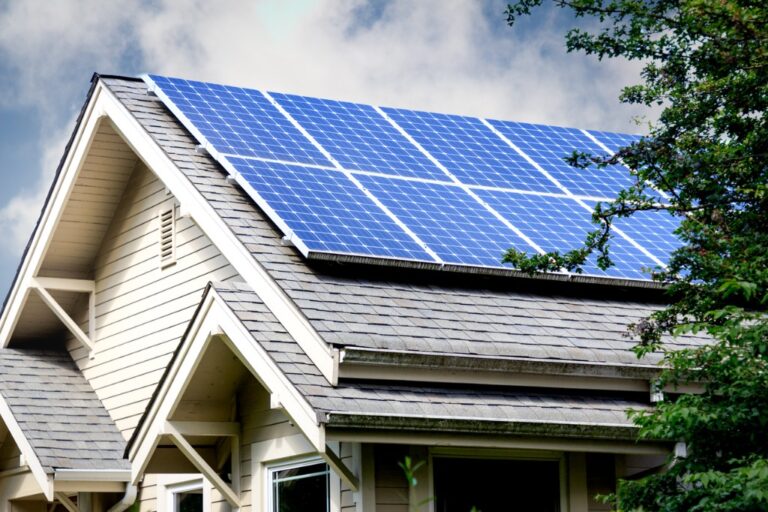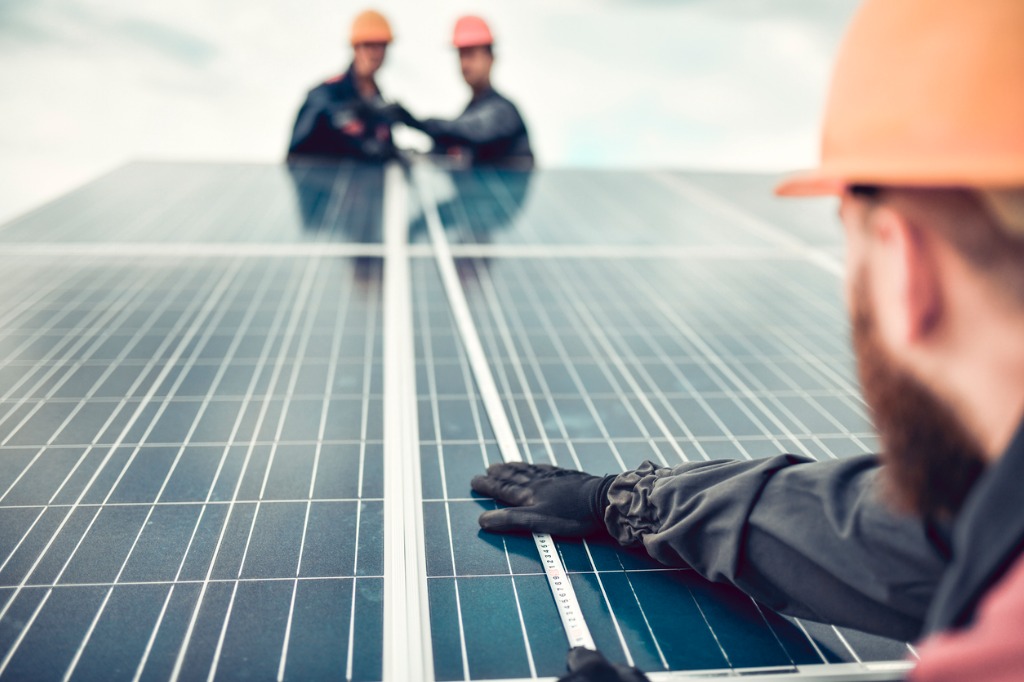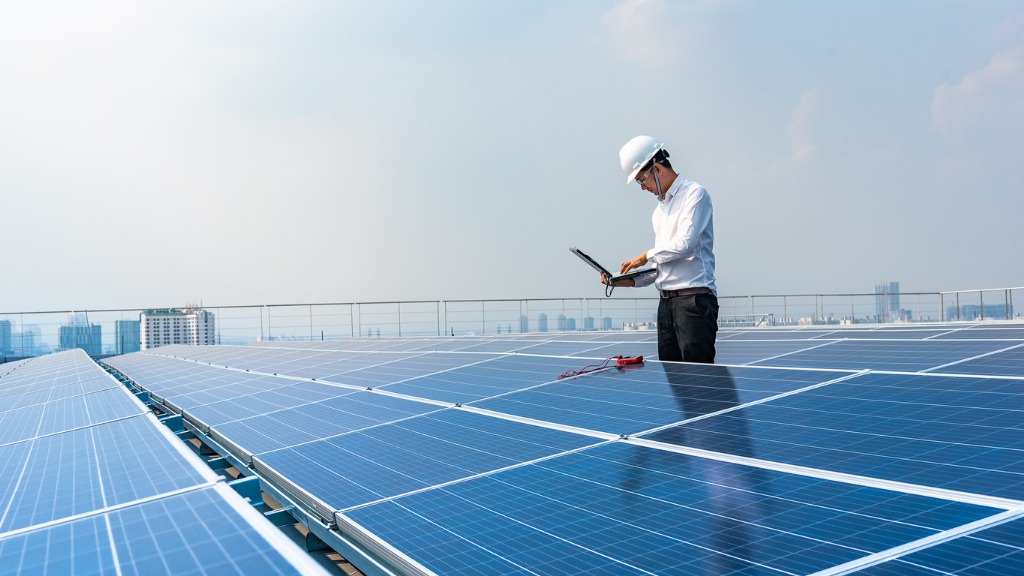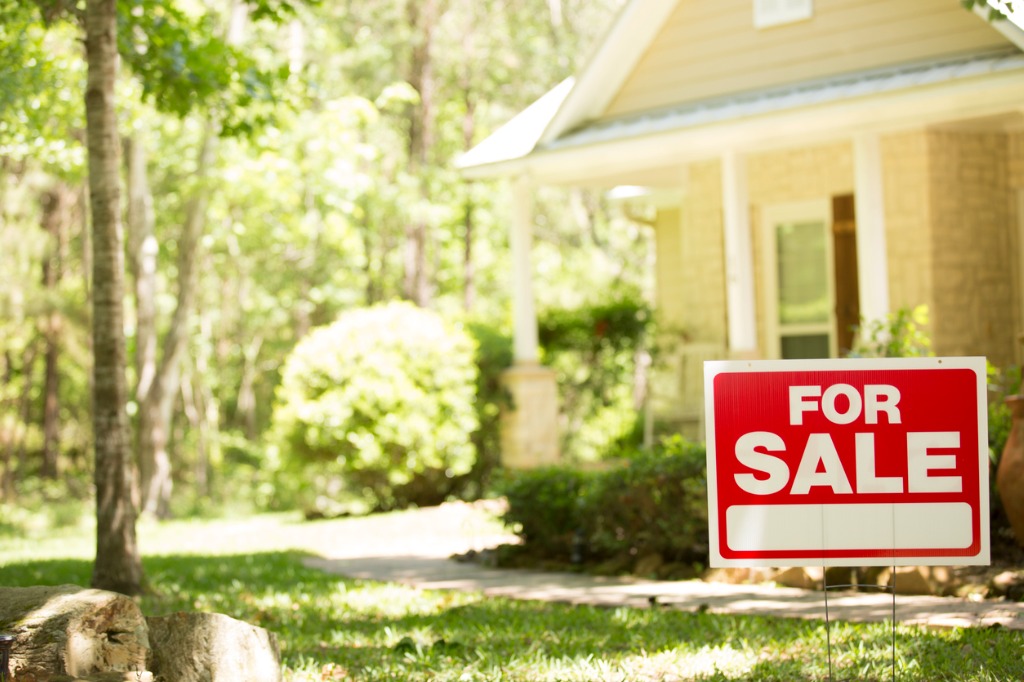
Photo by Cindy Shebley via iStock
Solar power is becoming increasingly popular, especially among homeowners looking to save money on energy costs. But there are many things you need to know before installing solar panels at home.
The video below, produced by Artisan Electrics, will walk you through the ten most important steps about putting in solar panels for your home.
Here are nine key things to consider before making the decision to install solar panels.
Table of Contents:
- Does My Roof Need Repairs?
- What Size Should My Roof Be?
- Do I Need Permits?
- What Type of System Do I Want?
- Is it Better to Lease or Buy?
- What Happens When I Sell My Property?
- What Should I Keep in Mind When Finding an Installer?
- What Should Be Included in My Contract?
- Does Installing Solar Panels Improve Efficiency?
- Ready to Install Solar Panels?
Does My Roof Need Repairs?
Before installing solar panels, you must determine if your roof needs any repairs. If it does, you might want to wait until those are done before installing solar panels.
Because solar panels typically go on the roof, your roof repair contractor may need to remove them later. Taking care of repairs first reduces the risk of your solar system getting damaged.
Installing Solar Panels: What Size Should My Roof Be?
 Photo by AleksandarGeorgiev via iStock
Photo by AleksandarGeorgiev via iStock
The size of your roof determines what type of solar panels you can use. Smaller systems with just 10 or 20 panels can fit on a smaller roof. A larger system requires a bigger roof.
For example, a typical single-axis tracking system uses about three square feet per watt of output. So if you plan to install 50 panels, you’d need a roof area of 150 square feet.
To calculate the total surface area needed, multiply the width of each panel times the height of each panel. Then add up the totals.
Do I Need Permits?
If you’re building a new house, you won’t need permits to install a solar system. However, if you’re adding solar panels to an existing structure, you’ll need to check with your city or county government.
Some municipalities require permits for projects that exceed certain sizes. Others require permits for any project that involves digging into the ground.
In some cases, you may even need a permit just to cut down trees. Find out from your local government what kind of permits and approvals your project needs before you get started.
What Type of System Do I Want When Installing Solar Panels?
 Photo by Worayuth Kamonsuwan via iStock
Photo by Worayuth Kamonsuwan via iStock
The three primary categories of solar power installations are grid-tied, off-grid, and hybrid. Each one will serve a unique purpose depending on your location and energy needs.
Grid systems are connected to the power grid and give you incentives to use renewable energy. They allow you to sell excess electricity back to the utility company.
Off-grid solar power systems do not connect to the grid. Therefore you must store all the electricity you generate. This requires significant battery storage, which is often expensive and difficult to maintain.
Hybrid systems combine both grid-tied and off-grid components. Regardless of which you choose, each solar panel system comes with its benefits and disadvantages.
Is It Better to Lease or Buy?
Solar leasing makes solar energy accessible to people who may not have thousands of dollars available. Instead, you pay a small fee each month and lease the equipment.
If you decide to sell it later, you’ll receive the full value of what you paid plus interest.
There are many different solar companies offering leasing options. Some offer lower rates, but others charge higher monthly fees. Verify the total up-front cost and duration of the agreement before signing any paperwork.
In 2022, the government started providing a federal tax credit option allowing homeowners to deduct 26% of the solar panel installation costs.
What Happens When I Sell My Property?

Photo by fstop123 via iStock
Solar power is becoming increasingly popular among homeowners looking to sell their properties. A solar installation can add up to $15,000 to a home’s resale price.
This is because solar energy provides a number of benefits, including saving money on utility bills and reducing carbon emissions.
The average homeowner spends around $2,500 per year on electricity, according to the National Renewable Energy Laboratory. You could reduce those costs by up to 80% by installing solar panels. And since it takes approximately ten years to recoup the initial investment cost of a solar system, you’ll save even more over the long term.
What Should I Keep in Mind When Finding an Installer?
There are many factors to think about before you install solar panels. Because solar panel installation is such a large investment, you’ll want to find someone with expertise and top-of-the-line equipment.
To find the best installer, ask yourself the following questions.
- How long has the installer been in business?
- How much relevant work experience do they possess? Do they specialize in residential installations or commercial installations?
- Have they installed solar systems in the area where you live? If yes, how did they perform?
- Are they licensed by the state?
What Should Be Included in My Contract When Installing Solar Panels?

Photo by mediaphotos via iStock
Your contract should include what equipment you’re receiving, how much you’ll pay, and when the project will be finished. It’s important to think things through carefully so you know what you agree to before signing anything.
The following advice will assist you in avoiding typical problems.
- Know What You Want. Before you draw up the contract, it’s important to know what exactly you want and expect the outcome to be. Once you know what you want, you’ll be able to narrow down your options.
- Understand the Details. Take a look at the fine print and ensure you receive everything you signed up for.
- Be Clear About Compensation. Being clear about compensation will ensure you get back what you deserve if anything goes wrong. Keep in mind that you don’t want to waste money on an endeavor that turns out to be unsuccessful.
Does Installing Solar Panels Improve Efficiency?
The average American household spends $1,500 per year on utilities. If you want to cut down on monthly bills, it makes sense to consider how you’re wasting energy. Improving your home’s energy efficiency through the use of an energy audit is a great idea.
Energy audits allow you to monitor your current consumption needs, energy usage, and patterns. You’ll learn exactly where you can make improvements and how much rooftop solar you need.
Ready to Install Solar Panels?
Putting solar panels on your roof has long-term benefits for the environment and your wallet. But you do have to plan and prepare for it. The process can be greatly simplified by following the steps outlined in this article.
Ultimately, you’ll end up avoiding costly utility bills, reducing your carbon footprint, and your home will be safer.
Learn More: